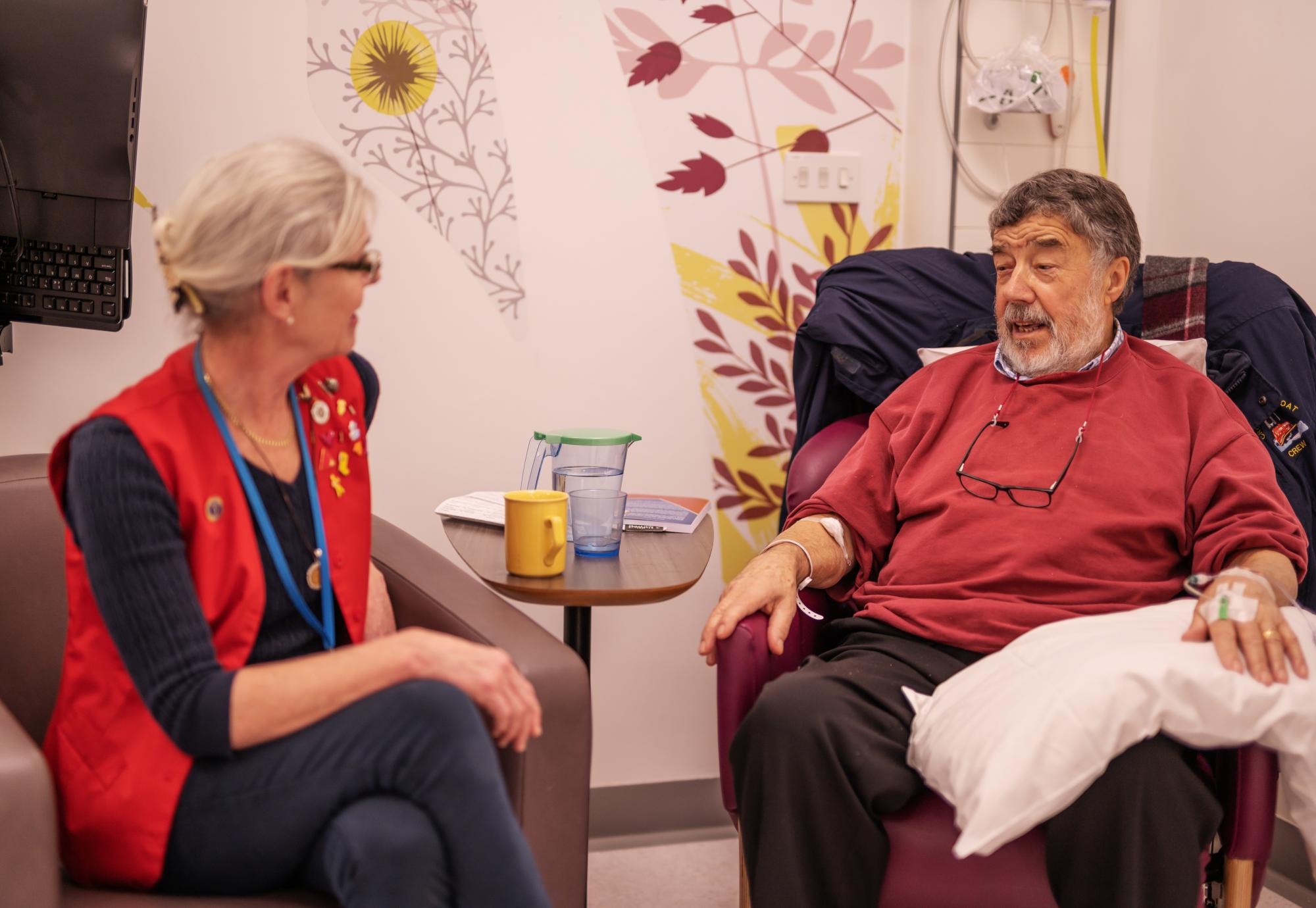The added pressures during the pandemic have made it even more complex for NHS staff to manage their workloads. But an area becoming even more beneficial in easing the increased demand, is volunteering. Mark Lever, Chief Executive at volunteering charity Helpforce, received an OBE in June for his services to volunteering during Covid-19.
He spoke to NHE about the work he was involved in to achieve this, and what the future looks like for volunteering in the NHS. The charity was set up four years ago to look at how the growth and impact of volunteering could be accelerated in the NHS. Strong relationships with NHS trusts and online networks were crucial in this process.
“We supported NHS trusts and volunteer service managers to develop roles, to provide more support to staff, to patients, and to families, and, to provide remote support for those families who couldn’t actually see their relatives who were at the end of life.
“We encouraged trusts to recruit critical care volunteers and looked at how volunteers could operate safely within the hospitals running hygiene hubs, as well as supporting staff with putting on PPE.”
Some of the challenges presented to people wanting to get involved in volunteering have included lengthy and bureaucratic processes. The charity wanted to encourage people “to think about ways in which they could strip out some of that bureaucracy, and really reduce, really truncate the time it took to get people on to wards.”
Embedding volunteering into system designs
Volunteering is an area that has become more and more utilised, especially in a time of national emergency. According to research carried out by Helpforce, volunteering at a system level has become even more recognised since the start of the pandemic. But it is an area seen as having low investment when it comes to management and leadership in trusts. Some of the ways around this include embedding volunteers into system-level strategic planning.
“I think there’s something about abut intelligently designed roles and making sure that they’re there for people to volunteer into. I think there’s also something about recognising that volunteer management and leadership needs to be invested in.
“I think the potential benefits and impacts that you can get from investing in those volunteer management functions are huge. It’s also really important that senior leadership support for volunteering is available and that volunteering is on board meeting agendas. This can help them really focus on how they can get the best out of the volunteers in the hospital. It’s important to make a sustainable commitment to measure the impact of volunteer roles against the goals of the trusts.
“I think that at a strategic level a lot of trusts will acknowledge volunteering, but when it comes down to the operational level, or the operational planning, I’m not sure that volunteering is really built into those plans, and because it’s not, it’s not necessarily budgeted for. So, I think we need to make sure that there is far greater engagement at that operational planning level.”
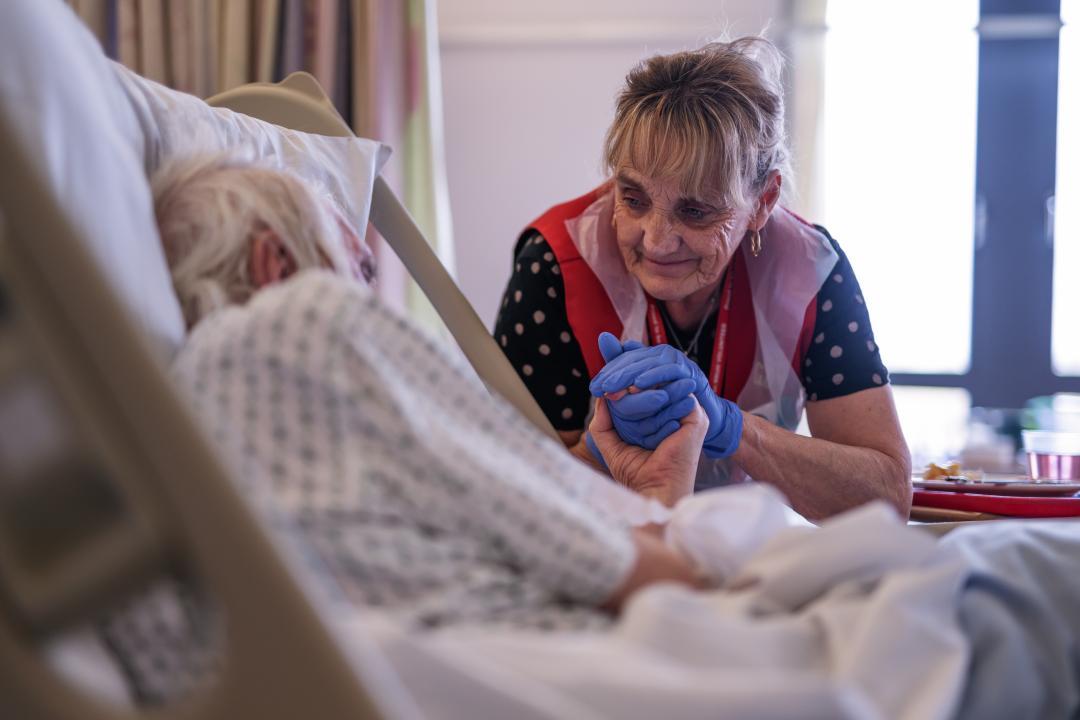
Picture: Volunteer with patient. Taken before the pandemic.
Supply and demand
Helpforce worked with several consultancy firms to create a matching platform, where the supply of products was able to meet the demand. This enabled NHS trusts to upload what they wanted, with input from companies detailing what they could offer, and Helpforce then matching this and delivering items to hospitals.
“Boden for instance, donated loads of clothes, including pyjamas, for staff and patients who found themselves isolated in hospital. Without any family being able to come in and bring them clothes, they were stranded.
“This was also for staff who couldn’t go home for risk of infection. So, we were able to give clothing parcels to staff. We worked with a number of tech organisations who donated iPads so that patients could keep in touch with their families when they couldn’t meet them face-to-face. So, there was a whole piece there around really utilising our networks to support people who wanted to match donations of goods, but also to look at ways in which we could support NHS trusts to make more Covid specific roles.”
Prior to the creation of specific volunteer roles, organisations experienced significant challenges when matching volunteers to activities. It meant that across the country, the supply of volunteers responding to Covid-19 was bigger than the capacity for organisations to work with them.
But one of the best examples of volunteers and organisations working together, can be seen during the vaccination programme, which Mark says, “wouldn’t have been as successful without volunteers.”
Some of the incentives around recruiting volunteers include quicker discharges, where volunteers are at patients’ homes ensuring they have a speedy recovery, and spend less time in hospital, which could hugely improve waiting lists.
Staff shortage resolution
A huge challenge that the NHS is facing is staffing, and that is even before the pandemic. The route from volunteering to a career in the NHS is a potential solution to this.
Ensuring that volunteers complete set training before becoming a volunteer has in some cases deterred people from taking up a position. This has started to change more though, where many NHS trusts and local authorities have recognised the opportunity to develop career pathways for volunteers, in their workforce plans.
“I think there are some really great benefits in situations where you have trusts who are looking at designing a route for volunteers to move into a career, where they’re looking at designing volunteer roles in areas where they struggle to recruit. Following this up through encouraging them to take a career in those areas is vital in this. So that linkage between volunteering teams and HR departments is really important as well.
“And I think in some trusts we need to make sure that we get much greater clinical support for volunteering as well, rather than it just being seen as the domain of the volunteering team, that actually it’s more closely linked to clinical support, and where it works really well, but that happens.”
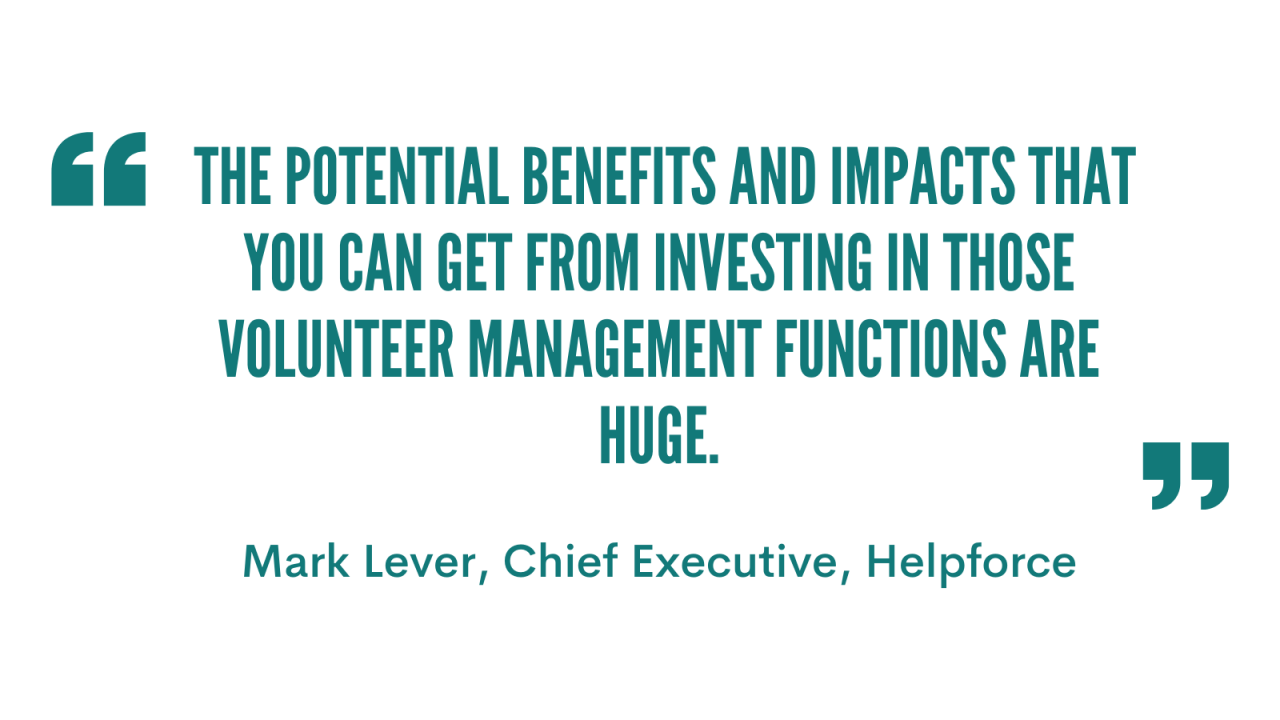
As volunteering becomes more and more valued, it is often the case that the local voluntary sector organisations are better equipped than statutory services, where volunteer roles are designed into the system; as well as the issue around recruitment being solved, with significant numbers of local people employed, and deployed through local voluntary and community sector organisations, and local authorities. Some of the local level work has involved the development of Covid Mutual Aid Groups.
Recruitment for volunteering has increased significantly, following more and more recognition of the role volunteers already play, and the potential benefits of having volunteers. Partner organisations have all responded at varying speeds when driving the recruitment of volunteering, which comes down to the different approaches.
Although there have been more and more examples of volunteering being better utilised, it is still an area not maximised to its full potential. For example, there are some instances where volunteers have been asked by NHS trusts to step down from their roles, to control the risk of infection to volunteers.
“Going forward we need to think about how volunteers could almost be designed into that health and care pathway and identifying where volunteers could really enhance the care and support that’s being offered by the paid clinical staff.
“Because, I think before the pandemic, volunteers were seen as a sort of nice to have, or a bolt on, and weren’t really necessarily taken that seriously by all NHS leaders. But the pandemic has shown, that if you’ve got clearly designed volunteer roles that are designed into that health and care pathway, then you can capitalize on this wave of public support that’s come forward of people who want to help, by giving them really clearly designed roles. That will really make a difference to staff, patients, and the patient flow within the hospital itself.”
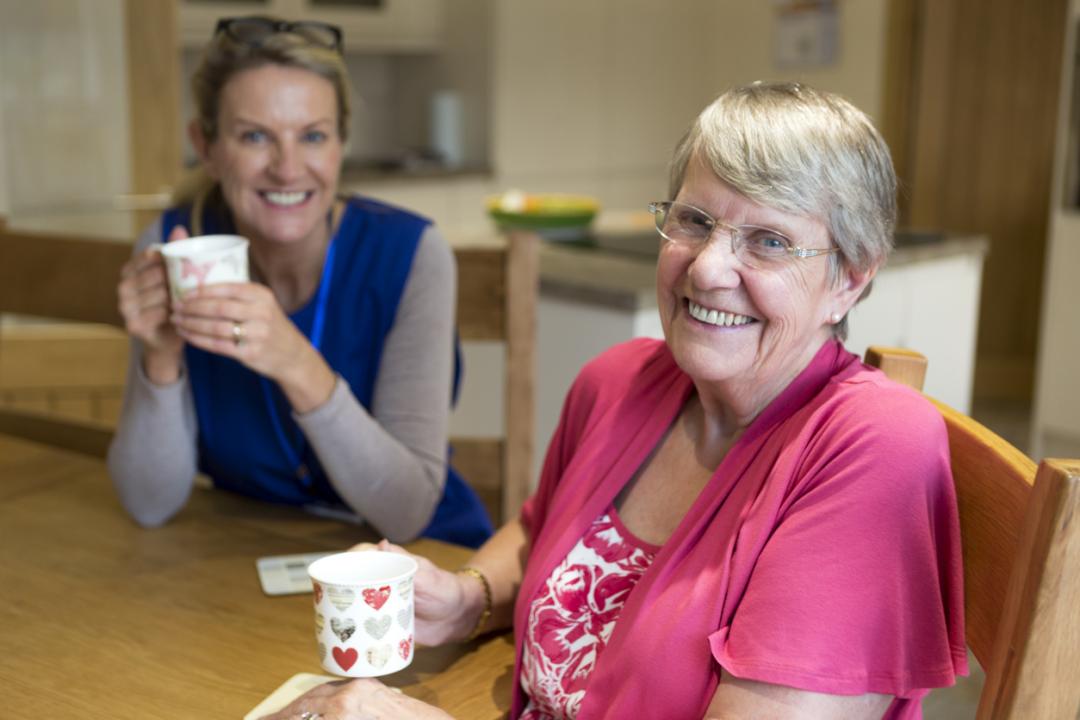
The future
To capture, and grow the evidence of impact of those roles, on staff, patients, volunteers themselves, and the system, NHS England commissioned Helpforce to run a Volunteer Innovators Programme, working alongside 12 trusts, on 12 different volunteering roles.
The evidence showed that staff felt less stressed when volunteers were working alongside them, freeing up more time to focus on clinical care. It meant that patient’s health outcomes improved because they were being supported with their hydration, nutrition, and mobility.
“Volunteers felt more positive; it was very beneficial for their own mental health, and patients were able to be discharged more quickly. When you’ve got evidence like that, you can start to make a business case to senior leaders for investing in volunteering and think about how you can deploy volunteers in a more creative and imaginative way.”
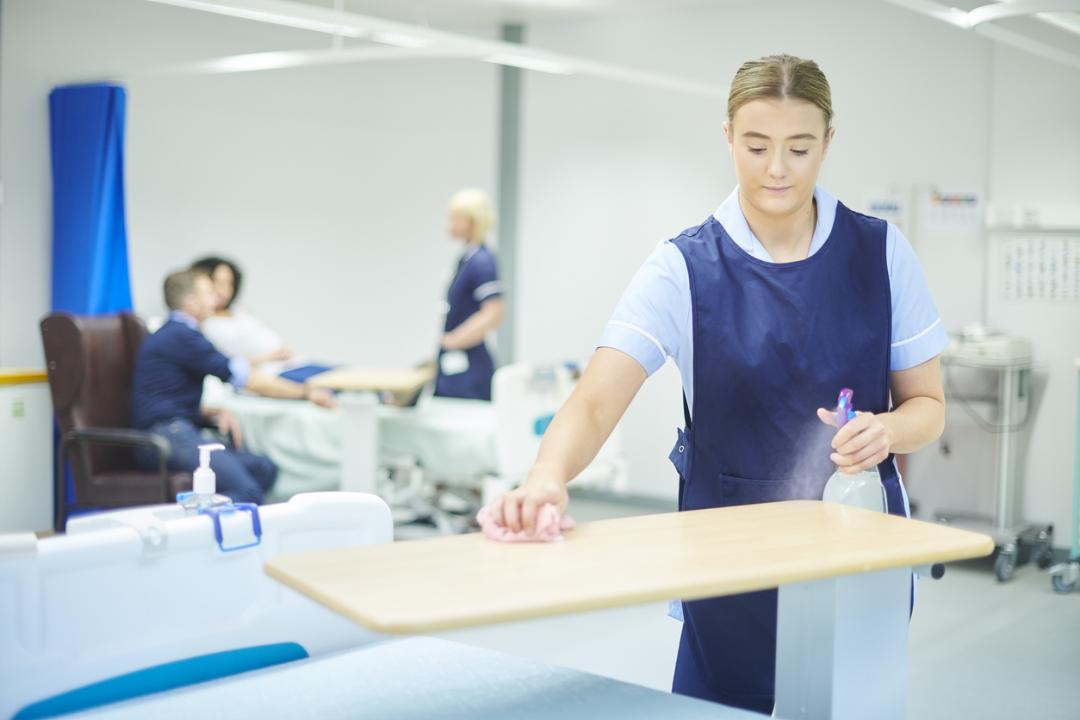
Statutory and voluntary organisations have already used the pandemic to create new ways of working together. There has since been a shift to more equal relationships, which has broken down simple transactional relationships that were previously recognised as provider and commissioned services. It has also improved relationships between volunteers and organisations, where volunteer needs have been priorities.
“Having an evidence base for volunteering, and sharing that with business leaders and trust leaders, means they start to look at volunteers differently; they don’t just see them as a nice to have. And I think that if people reflected on the volunteer response through the pandemic, they’re thinking, volunteers are critical in a crisis.
“But what we’re saying is volunteers are critical in business as usual as well, which can really help enhance the position. And I think from our point of view volunteers are critical in helping the nation get back to health.
“There are some brilliant examples of great practice in volunteering, and the pandemic has really acted as a catalyst for that. The key thing is for us to build on the legacy of that, and not let it fizzle away, and actually to make sure we build on the legacy of volunteering during the pandemic and integrate it into business as usual as we go forward.”

